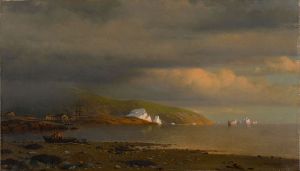William Carlos Williams’ “Labrador” (1948)
 It’s National Poetry Month, and we’re continuing our focus on the poems of William Carlos Williams.
It’s National Poetry Month, and we’re continuing our focus on the poems of William Carlos Williams.
As much as we might wish to have a unified understanding of nature, we have no choice but to break it into tractable chunks. Richard Feynman put it eloquently in his Lectures on Physics:
If we look at a glass of wine closely enough we see the entire universe. There are the things of physics: the twisting liquid which evaporates depending on the wind and weather, the reflections in the glass, and our imagination adds the atoms. The glass is a distillation of the earth’s rocks, and in its composition we see the secrets of the universe’s age, and the evolution of the stars. What strange array of chemicals are in the wine? How did they come to be? There are the ferments, the enzymes, the substrates, and the products. There in wine is found the great generalization: all life is fermentation. Nobody can discover the chemistry of wine without discovering, as did Louis Pasteur, the cause of much disease. How vivid is the claret, pressing its existence into the consciousness that watches it! If our small minds, for some convenience, divide this glass of wine, this universe, into parts – physics, biology, geology, astronomy, psychology, and so on – remember that nature does not know it! So let us put it all back together, not forgetting ultimately what it is for. Let it give us one more final pleasure: drink it and forget it all!
In his poem “Labrador,” William Carlos Williams expresses the same tension between the seamless workings of nature and and his “straining mind.” The poem recalls a vacation Williams took to Labrador, where he swam in the icy waters of Northern Canada.
The poem begins with an image of nature’s forces in action: the firm rocks and the “waters of the world” that wash around them. Set against this display of power is Williams, cold, pale, with his awkward limbs. His straining, observing mind, struggles to find concepts to comprehend the sea. But the sea, unmarred by the poet’s entry into the water and not recognizing the categories with which he divides the world, simply lifts Williams and his mind in a single, effortless gesture.
Labrador How clean these shallows how firm these rocks stand about which wash the waters of the world It is ice to this body that unclothes its pallors to thoughts of an immeasurable sea, unmarred, that as it lifts encloses this straining mind, these limbs in a single gesture.
“Labrador,” William Carlos Williams, Selected Poems, ed. Charles Tomlinson (New York: New Directions, 1985), originally published in The Clouds, (Wells College Press/Cummington Press, 1948)
Read more science poems at the Finch & Pea.
Image credit: William Bradford, “Near Cape St. Johns, Coast of Labrador” (1874), via Wikimedia Commons
